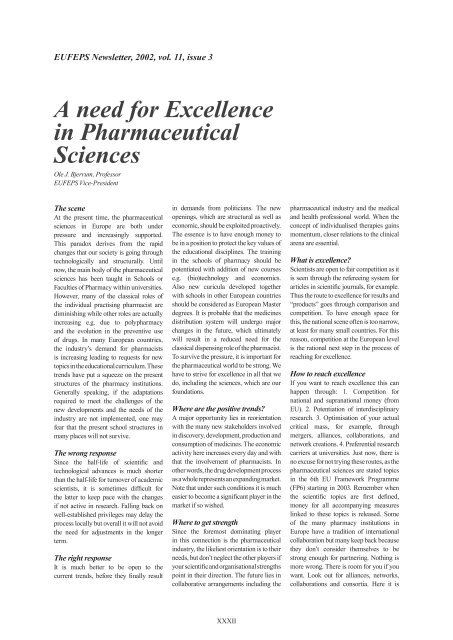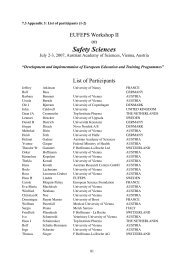2011 Anniversary Yearbook - EUFEPS today and history
2011 Anniversary Yearbook - EUFEPS today and history
2011 Anniversary Yearbook - EUFEPS today and history
You also want an ePaper? Increase the reach of your titles
YUMPU automatically turns print PDFs into web optimized ePapers that Google loves.
<strong>EUFEPS</strong> Newsletter, 2002, vol. 11, issue 3<br />
A need for Excellence<br />
in Pharmaceutical<br />
Sciences<br />
Ole J. Bjerrum, Professor<br />
<strong>EUFEPS</strong> Vice-President<br />
The scene<br />
At the present time, the pharmaceutical<br />
sciences in Europe are both under<br />
pressure <strong>and</strong> increasingly supported.<br />
This paradox derives from the rapid<br />
changes that our society is going through<br />
technologically <strong>and</strong> structurally. Until<br />
now, the main body of the pharmaceutical<br />
sciences has been taught in Schools or<br />
Faculties of Pharmacy within universities.<br />
However, many of the classical roles of<br />
the individual practising pharmacist are<br />
diminishing while other roles are actually<br />
increasing e.g. due to polypharmacy<br />
<strong>and</strong> the evolution in the preventive use<br />
of drugs. In many European countries,<br />
the industry’s dem<strong>and</strong> for pharmacists<br />
is increasing leading to requests for new<br />
topics in the educational curriculum. These<br />
trends have put a squeeze on the present<br />
structures of the pharmacy institutions.<br />
Generally speaking, if the adaptations<br />
required to meet the challenges of the<br />
new developments <strong>and</strong> the needs of the<br />
industry are not implemented, one may<br />
fear that the present school structures in<br />
many places will not survive.<br />
The wrong response<br />
Since the half-life of scientific <strong>and</strong><br />
technological advances is much shorter<br />
than the half-life for turnover of academic<br />
scientists, it is sometimes difficult for<br />
the latter to keep pace with the changes<br />
if not active in research. Falling back on<br />
well-established privileges may delay the<br />
process locally but overall it will not avoid<br />
the need for adjustments in the longer<br />
term.<br />
The right response<br />
It is much better to be open to the<br />
current trends, before they finally result<br />
in dem<strong>and</strong>s from politicians. The new<br />
openings, which are structural as well as<br />
economic, should be exploited proactively.<br />
The essence is to have enough money to<br />
be in a position to protect the key values of<br />
the educational disciplines. The training<br />
in the schools of pharmacy should be<br />
potentiated with addition of new courses<br />
e.g. (bio)technology <strong>and</strong> economics.<br />
Also new curicula developed together<br />
with schools in other European countries<br />
should be considered as European Master<br />
degrees. It is probable that the medicines<br />
distribution system will undergo major<br />
changes in the future, which ultimately<br />
will result in a reduced need for the<br />
classical dispensing role of the pharmacist.<br />
To survive the pressure, it is important for<br />
the pharmaceutical world to be strong. We<br />
have to strive for excellence in all that we<br />
do, including the sciences, which are our<br />
foundations.<br />
Where are the positive trends?<br />
A major opportunity lies in reorientation<br />
with the many new stakeholders involved<br />
in discovery, development, production <strong>and</strong><br />
consumption of medicines. The economic<br />
activity here increases every day <strong>and</strong> with<br />
that the involvement of pharmacists. In<br />
other words, the drug development process<br />
as a whole represents an exp<strong>and</strong>ing market.<br />
Note that under such conditions it is much<br />
easier to become a significant player in the<br />
market if so wished.<br />
Where to get strength<br />
Since the foremost dominating player<br />
in this connection is the pharmaceutical<br />
industry, the likeliest orientation is to their<br />
needs, but don’t neglect the other players if<br />
your scientific <strong>and</strong> organisational strengths<br />
point in their direction. The future lies in<br />
collaborative arrangements including the<br />
XXXII<br />
pharmaceutical industry <strong>and</strong> the medical<br />
<strong>and</strong> health professional world. When the<br />
concept of individualised therapies gains<br />
momentum, closer relations to the clinical<br />
arena are essential.<br />
What is excellence?<br />
Scientists are open to fair competition as it<br />
is seen through the refereeing system for<br />
articles in scientific journals, for example.<br />
Thus the route to excellence for results <strong>and</strong><br />
“products” goes through comparison <strong>and</strong><br />
competition. To have enough space for<br />
this, the national scene often is too narrow,<br />
at least for many small countries. For this<br />
reason, competition at the European level<br />
is the rational next step in the process of<br />
reaching for excellence.<br />
How to reach excellence<br />
If you want to reach excellence this can<br />
happen through: 1. Competition for<br />
national <strong>and</strong> supranational money (from<br />
EU). 2. Potentiation of interdisciplinary<br />
research. 3. Optimisation of your actual<br />
critical mass, for example, through<br />
mergers, alliances, collaborations, <strong>and</strong><br />
network creations. 4. Preferential research<br />
carriers at universities. Just now, there is<br />
no excuse for not trying these routes, as the<br />
pharmaceutical sciences are stated topics<br />
in the 6th EU Framework Programme<br />
(FP6) starting in 2003. Remember when<br />
the scientific topics are first defined,<br />
money for all accompanying measures<br />
linked to these topics is released. Some<br />
of the many pharmacy institutions in<br />
Europe have a tradition of international<br />
collaboration but many keep back because<br />
they don’t consider themselves to be<br />
strong enough for partnering. Nothing is<br />
more wrong. There is room for you if you<br />
want. Look out for alliances, networks,<br />
collaborations <strong>and</strong> consortia. Here it is




